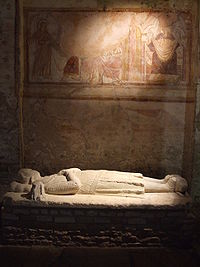Jocerand de Brancion
Jocerand III. Gros de Brancion († February 11, 1250 at the Battle of al-Mansura ) was a French nobleman and knight . He was a son of Sire Heinrich I Gros von Brancion and Beatrix von Vignory.
Jocerand inherited the rule of Brancion and Uxelles from his father , where he first had one of the largest castles in Burgundy . In 1214 he ended a generation-long dispute between his family and Cluny Abbey over disputed property rights. He had been married to Margarete von Salins († 1257/59) from about 1221, who had sold her rich inheritance, the rule of Salins , to the Duke of Burgundy in 1225 . In 1237 the duke had given this rule to Count Johann von Chalon , which led to the outbreak of an ongoing feud between him and Jocerand. In the course of this feud, Jocerand was surprised by his opponent and his nephew, Jean de Joinville , during prayer on a Good Friday in an abbey. Before the fight began, he exhorted the Count of Chalon to end the feud, as he wanted to reach the heavenly kingdom in a higher service in his old days. The feud was contractually ended in 1240.
Joinville described Jocerand as one of the best knights he had ever met. He emerged as an honorable winner from thirty-six duels. Jocerand and his son took part in the sixth crusade to Egypt in the wake of Prince Alfonso of Poitiers . During the siege of al-Mansura , on February 11, 1250, a battle between the Crusaders and the Mamluks broke out outside the walls of the city . Jocerand was surrounded by the enemy in the course of the fight, the Duke of Burgundy tried to save him from the camp on the opposite side of the arm of the Nile by firing volleys of arrows. Nevertheless, he was overwhelmed and killed.
Jocerand was buried in Uxelles, but the reclining figure of his grave has been on display in the Saint-Pierre church in Brancion since 1959. His son Heinrich II. Gros, who had survived the crusade, sold Brancion and Uxelles to the Duke of Burgundy in 1259.
source
- The Memoirs of the Lord of Joinville , II, §12, ed. by Ethel Wedgwood (1906)
Remarks
- ↑ Since the 11th century the family has been using the name "Gros" or "Grossi" (Latin: Grossus ) as cognomen . Constance B. Bouchard: The Origins of the French Nobility: A Reassessment , in: The American Historical Review Vol. 86 (1981), p. 522
| personal data | |
|---|---|
| SURNAME | Jocerand de Brancion |
| ALTERNATIVE NAMES | Jocerand III. Gros de Brancion (full name) |
| BRIEF DESCRIPTION | Lord of Brancion and Uxelles, crusaders |
| DATE OF BIRTH | 12th century or 13th century |
| DATE OF DEATH | February 11, 1250 |
| Place of death | al-Mansura |

